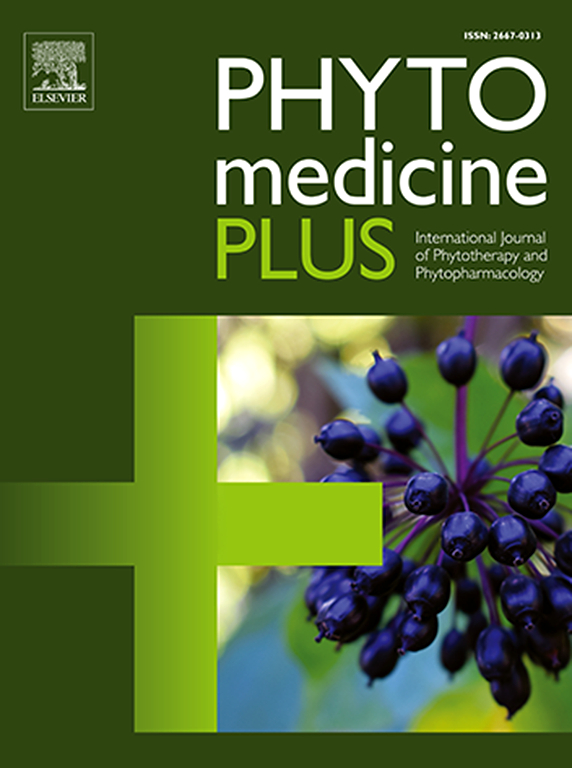冬凌草素:一种天然萜类化合物,具有调节癌症细胞凋亡和生存信号的潜力
Q3 Pharmacology, Toxicology and Pharmaceutics
引用次数: 0
摘要
doridonin是一种从药用植物中提取的二萜类内酯,因其潜在的治疗作用,特别是抗癌作用而受到广泛关注。它通过调节PI3K/AKT、MAPKs和NF-κB等关键信号通路,诱导细胞凋亡,抑制癌细胞增殖,并使细胞对常规化疗药物敏感。目的探讨冬凌草甲素的凋亡机制和抗癌潜力,包括其对信号通路的调节作用及其衍生物对耐药癌细胞的增强作用。方法采用Scopus、PubMed、SpringerLink、ScienceDirect、Wiley Online、Web of Science等数据库进行系统的文献检索,检索时间为2007 - 2024年。关键词包括“oriidonin”、“Apoptosis”、“Cancer Cell Signaling Pathways”、“PI3K/AKT”、“ROS”、“Nanotechnology”等,共获得96项相关研究。结果soridonin通过内源性和外源性途径诱导细胞凋亡,包括ROS扩增和线粒体膜电位调节。它调节Bax、Bcl-2、细胞色素c和半胱天冬酶等蛋白质,导致DNA断裂。其衍生物,如13p,通过抑制G2/M期和以最小毒性靶向耐药细胞而表现出增强的效力。先进的纳米输送系统和联合疗法进一步增强了冬凌草甲素的治疗潜力。结论冬凌草甲素通过调节信号通路,诱导细胞凋亡,具有较强的抗癌活性。其衍生物和新型给药系统为克服耐药性和优化其治疗效果提供了有希望的途径。进一步的研究,包括临床试验,是必要的,以充分利用其作为癌症治疗替代方案的潜力。本文章由计算机程序翻译,如有差异,请以英文原文为准。
Oridonin: A natural terpenoid having the potential to modulate apoptosis and survival signaling in cancer
Background
Oridonin, a diterpenoid lactone derived from medicinal plants, has drawn considerable attention due to its therapeutic potential, particularly its anticancer properties. It demonstrates efficacy in inducing apoptosis, suppressing cancer cell proliferation, and sensitizing cells to conventional chemotherapeutics by modulating key signaling pathways like PI3K/AKT, MAPKs, and NF-κB.
Purpose
This article investigates the apoptotic mechanisms and anticancer potential of oridonin, including its modulatory effects on signaling pathways and its derivatives' enhanced efficacy against drug-resistant cancer cells.
Methods
A systematic literature search was conducted using Scopus, PubMed, SpringerLink, ScienceDirect, Wiley Online, and Web of Science databases, covering the period from 2007 to 2024. Keywords such as "Oridonin," "Apoptosis," "Cancer Cell Signaling Pathways," "PI3K/AKT," "ROS," and "Nanotechnology" were used, yielding 96 relevant studies.
Results
Oridonin induces apoptosis through intrinsic and extrinsic pathways, involving ROS amplification and mitochondrial membrane potential regulation. It modulates proteins like Bax, Bcl-2, cytochrome c, and caspases, leading to DNA fragmentation. Its derivatives, such as 13p, exhibit enhanced potency by arresting the G2/M phase and targeting drug-resistant cells with minimal toxicity. Advanced nano-delivery systems and combination therapies further enhance oridonin's therapeutic potential.
Conclusion
Oridonin demonstrates robust anticancer activity by modulating signaling pathways and inducing apoptosis. Its derivatives and novel delivery systems offer promising avenues for overcoming drug resistance and optimizing its therapeutic efficacy. Further research, including clinical trials, is necessary to fully harness its potential as a cancer treatment alternative.
求助全文
通过发布文献求助,成功后即可免费获取论文全文。
去求助
来源期刊

Phytomedicine Plus
Medicine-Complementary and Alternative Medicine
CiteScore
3.70
自引率
0.00%
发文量
178
审稿时长
81 days
期刊介绍:
 求助内容:
求助内容: 应助结果提醒方式:
应助结果提醒方式:


